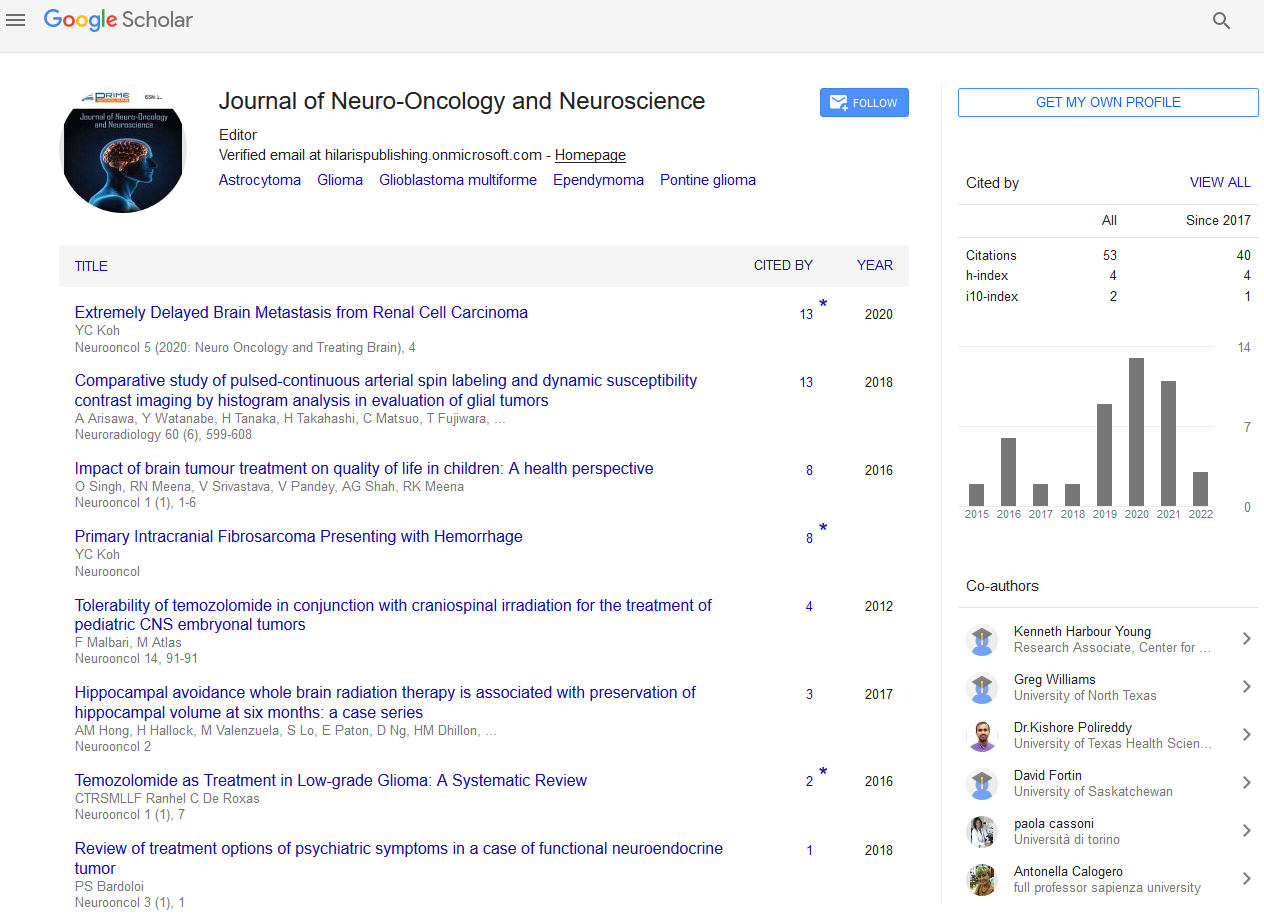Short Communication - (2023) Volume 8, Issue 4
Neuro-oncology Clinical Trials: Forging Ahead on Promising Research Frontiers
Nicholas Miller*
Department of Oral and Maxillofacial Surgery, National University of Singapore, Singapore
*Correspondence:
Nicholas Miller,
Department of Oral and Maxillofacial Surgery, National University of Singapore,
Singapore,
Email:
Received: 29-Nov-2023, Manuscript No. IPJNO-24-19625;
Editor assigned: 01-Dec-2023, Pre QC No. IPJNO-24-19625 (PQ);
Reviewed: 15-Dec-2023, QC No. IPJNO-24-19625;
Revised: 20-Dec-2023, Manuscript No. IPJNO-24-19625 (R);
Published:
27-Dec-2023, DOI: 10.21767/2572-0376.8.4.40
Introduction
Neuro-oncology clinical trials represent the vanguard of
research in the battle against brain tumors, aiming to translate
scientific discoveries into novel therapies that improve
patient outcomes and quality of life. These trials encompass
a wide range of investigational approaches, including targeted
therapies, immunotherapies, innovative surgical techniques,
and precision medicine strategies, all aimed at addressing the
unique challenges posed by brain tumors. As researchers and
clinicians continue to push the boundaries of knowledge and
innovation, neuro-oncology clinical trials offer hope for patients
and families affected by these devastating diseases. One of the
most promising areas of research in neuro-oncology clinical
trials is the development of targeted therapies that specifically
target molecular pathways implicated in tumor growth and
progression. Advances in genomic profiling have revealed
a multitude of genetic alterations driving the development
of brain tumors, including mutations in genes such as EGFR,
IDH1/2, and BRAF.
Description
Clinical trials are investigating the use of small molecule
inhibitors of the EGFR pathway, such as erlotinib and gefitinib,
for the treatment of glioblastoma (GBM) patients with EGFR
amplification or mutations. Similarly, inhibitors of the IDH1/2
enzymes, such as ivosidenib and enasidenib, have shown
promising results in patients with IDH-mutant gliomas,
leading to FDA approval for the treatment of relapsed or
refractory disease. These targeted therapies represent a
paradigm shift in the management of brain tumors, offering
new hope for patients with genetically defined subtypes of
the disease. Furthermore, immunotherapy has emerged as a
promising treatment modality for patients with brain tumors,
harnessing the power of the immune system to recognize and
eliminate tumor cells. Clinical trials are investigating various
immunotherapeutic approaches, including immune checkpoint
inhibitors, chimeric antigen receptor (CAR) T-cell therapy, and
cancer vaccines, for the treatment of gliomas and other central
nervous system malignancies. These immunotherapies aim to
overcome the immunosuppressive microenvironment of brain
tumors and stimulate anti-tumor immune responses, leading
to durable responses and improved survival outcomes.
In addition to targeted therapies and immunotherapies,
neuro-oncology clinical trials are exploring innovative surgical
techniques and precision medicine strategies to improve
patient outcomes. For example, trials are investigating the use
of intraoperative imaging modalities, such as fluorescenceguided
surgery and intraoperative MRI, to improve the extent
of tumor resection and minimize damage to surrounding
healthy tissue. Similarly, precision medicine approaches, such
as molecular profiling and liquid biopsy, are being used to
identify actionable genetic alterations and tailor treatment
regimens to individual patient characteristics. Moreover,
neuro-oncology clinical trials are at the forefront of exploring
combination therapies that target multiple pathways
implicated in tumor growth and progression. Combinatorial
approaches, such as concurrent or sequential administration
of targeted therapies, immunotherapies, and conventional
treatments such as chemotherapy and radiation therapy, aim
to synergistically enhance treatment efficacy and overcome
treatment resistance [1-4].
Conclusion
Neuro-oncology clinical trials represent a dynamic and rapidly
evolving field of research, exploring innovative approaches
to diagnosis, treatment, and management of brain tumors.
Targeted therapies, immunotherapies, precision medicine
strategies, and combination therapies offer new hope for
patients facing the challenges of brain tumors, providing
opportunities for improved outcomes and prolonged survival. Through collaboration, innovation, and perseverance,
researchers and clinicians are forging ahead on promising
research frontiers, working towards a future where effective
treatments for brain tumors are within reach.
Acknowledgement
None.
Conflict Of Interest
The author’s declared that they have no conflict of interest.
References
- Barbut F, Richard A, Hamadi K, Chomette V, Burghoffer B, et al. (2000) Epidemiology of recurrences or reinfections of Clostridium difficile-associated diarrhea. J Clin Microbiol. 38(6):2386-2388.
[Crossref] [Google Scholar] [PubMed]
- Rafii F, Sutherland J, Cerniglia C (2008) Effects of treatment with antimicrobial agents on the human colonic microflora. Ther Clin Risk Manag. 4:1343-1358.
[Crossref] [Google Scholar] [PubMed]
- Konijeti G, Sauk J, Shrime MG, Ananthakrishnan AN (2014) Cost-effectiveness of competing strategies for management of recurrent Clostridium difficile infection: A decision analysis. Clin Infect Dis. 58(11):1507-1514.
[Crossref] [Google Scholar] [PubMed]
- Gravelle H, Brouwer W, Niessen L, Postma L, Rutten F (2007) Discounting in economic evaluations: Stepping forward towards optimal decision rules. Health Econ, 2007. 16:307-317.
[Crossref] [Google Scholar] [PubMed]
Citation: Miller N (2023) Neuro-oncology Clinical Trials: Forging Ahead on Promising Research Frontiers. Neurooncol. 8:040.
Copyright: ©2023 Miller N. This is an open-access article distributed under the terms of the Creative Commons Attribution License, which permits unrestricted use, distribution, and reproduction in any medium, provided the original author and source are credited.

